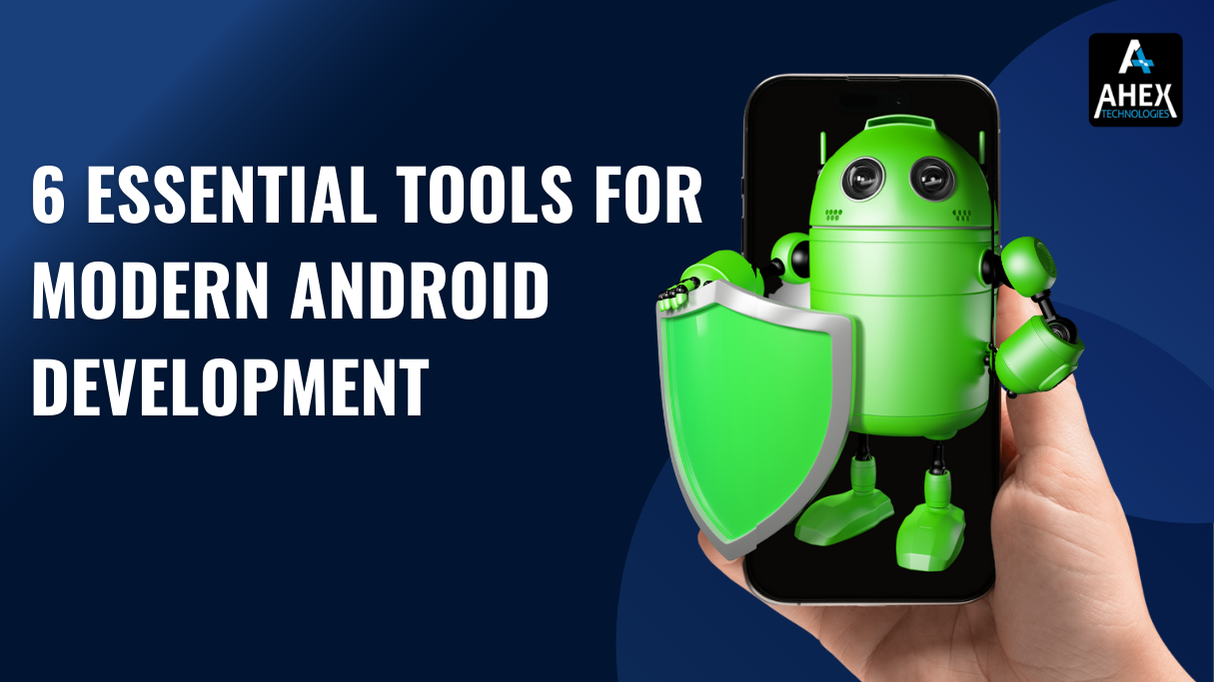6 Essential Tools for Modern Android Development
 Ahex Technologies
Ahex Technologies
In the fast-evolving world of mobile app development, having the right tools can make all the difference. Android development has become a dominant force in the mobile ecosystem, with millions of apps available on the Google Play Store. To help developers streamline their workflow, enhance productivity, and build high-quality applications, this article explores six essential tools that every modern Android developer should consider. These tools cover integrated development environments (IDEs), version control systems, and more, providing a comprehensive toolkit for both newcomers and seasoned developers.
1. Android Studio
Overview:
Android Studio is the official integrated development environment (IDE) for Android app development, created by Google. It is built on IntelliJ IDEA and offers a robust set of features tailored specifically for Android development.
Key Features:
Code Editor: A powerful code editor with syntax highlighting, code completion, and refactoring tools that enhance the coding experience.
Layout Editor: A drag-and-drop interface that allows developers to create user interfaces without writing XML manually.
Android Emulator: An embedded emulator that lets developers test their apps on various devices and configurations without needing physical hardware.
Gradle Build System: Streamlines project setup and dependency management, allowing developers to automate the build process.
Benefits:
Using Android Studio allows developers to work efficiently, ensuring that they can focus on creating great applications. Its integration with version control systems, like Git, further enhances collaboration within teams.
For more information about Android Studio and its features, visit the Android Developers site.
2. Git
Overview:
Git is a version control system that enables developers to track changes in their codebase and collaborate effectively with team members. It is an essential tool for any modern Android development company.
Key Features:
Branching: Allows developers to create branches for new features or bug fixes without affecting the main codebase.
Merging: Facilitates collaboration by enabling developers to combine changes from different branches seamlessly.
History Tracking: Provides a complete history of changes made to the code, allowing for easy rollbacks and audits.
Best Practices for Android Development:
Frequent Commits: Commit code changes regularly to capture progress and maintain a clear history.
Descriptive Messages: Use meaningful commit messages to explain the purpose of changes, which aids in understanding project evolution.
Pull Requests: Use pull requests to review code changes before merging them into the main branch, ensuring quality and collaboration.
By incorporating Git into their workflow, Android developers can manage their projects more effectively, minimize errors, and foster teamwork.
For best practices and guidelines on using Git, check out Git documentation.
3. Firebase
Overview:
Firebase is a comprehensive mobile development platform that provides various services to help developers build high-quality apps. It offers backend services such as real-time databases, authentication, and cloud storage, making it a popular choice among Android developers.
Key Features:
Real-time Database: Allows developers to store and sync data in real time across all clients.
Authentication: Simplifies user authentication processes by offering multiple sign-in methods, including email, Google, and Facebook.
Crashlytics: A powerful tool for tracking and fixing crashes, providing insights into app stability.
Benefits:
Firebase significantly reduces the time and effort required to set up and maintain backend infrastructure, allowing developers to focus on building features and improving user experiences.
For further details on Firebase features, visit the Firebase documentation.
4. Gradle
Overview:
Gradle is a build automation tool that plays a crucial role in the Android development ecosystem. It simplifies project setup and dependency management for Android apps.
Key Features:
Dependency Management: Allows developers to declare and manage dependencies in a centralized manner, ensuring that the correct versions of libraries are used.
Custom Build Configurations: Enables the creation of different build variants (e.g., debug and release) with specific configurations.
Task Automation: Automates repetitive tasks, such as compiling code, running tests, and generating APKs.
Benefits:
Gradle streamlines the build process, reducing development time and minimizing errors. By automating various tasks, developers can focus on writing code and delivering features.
To learn more about Gradle for Android development, refer to the Gradle documentation.
5. Android Debug Bridge (ADB)
Overview:
ADB is a versatile command-line tool that facilitates communication between a computer and an Android device. It is essential for debugging, managing files, and installing applications during development.
Key Features:
Device Management: Connects to physical devices or emulators to execute commands remotely.
Logcat: Provides a system log that displays messages from the system, which is invaluable for debugging purposes.
File Transfer: Allows developers to push and pull files between the development machine and the Android device.
Benefits:
ADB simplifies the debugging process and helps developers troubleshoot issues quickly, enhancing the overall development experience.
For detailed instructions on using ADB, visit the Android Developer documentation.
6. Postman
Overview:
Postman is a popular API testing tool that helps developers test and document APIs. It is especially useful in Android development for testing backend services.
Key Features:
User-Friendly Interface: Simplifies the process of sending requests and viewing responses, making it easy to test APIs.
Collaboration: Enables teams to share API collections and documentation, facilitating collaboration.
Automated Testing: Allows developers to create and run automated tests for their APIs.
Benefits:
Using Postman improves the efficiency of API development and testing, ensuring that Android apps can communicate effectively with backend services.
To learn more about Postman and its capabilities, visit the Postman website.
Conclusion
In modern Android development, leveraging the right tools can significantly enhance productivity and streamline the coding process. Android Studio, Git, Firebase, Gradle, ADB, and Postman are essential tools that cater to different aspects of the development lifecycle. By incorporating these tools into your workflow, you can improve collaboration, reduce development time, and build high-quality Android applications.
Subscribe to my newsletter
Read articles from Ahex Technologies directly inside your inbox. Subscribe to the newsletter, and don't miss out.
Written by
